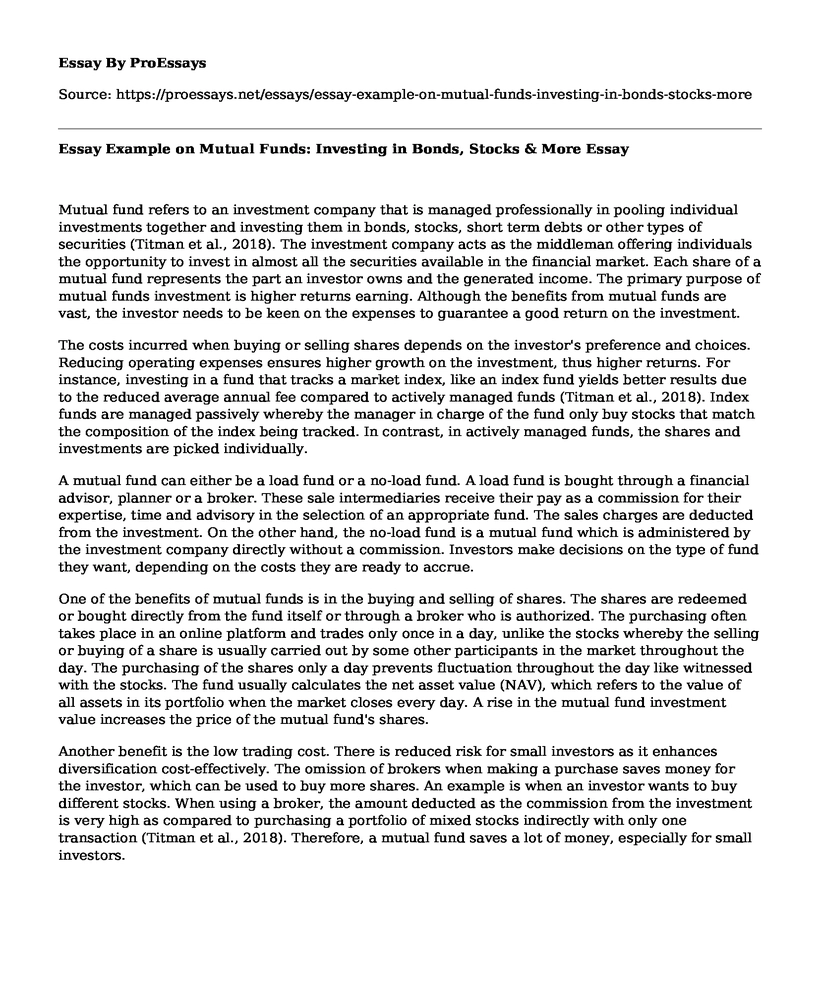Mutual fund refers to an investment company that is managed professionally in pooling individual investments together and investing them in bonds, stocks, short term debts or other types of securities (Titman et al., 2018). The investment company acts as the middleman offering individuals the opportunity to invest in almost all the securities available in the financial market. Each share of a mutual fund represents the part an investor owns and the generated income. The primary purpose of mutual funds investment is higher returns earning. Although the benefits from mutual funds are vast, the investor needs to be keen on the expenses to guarantee a good return on the investment.
The costs incurred when buying or selling shares depends on the investor's preference and choices. Reducing operating expenses ensures higher growth on the investment, thus higher returns. For instance, investing in a fund that tracks a market index, like an index fund yields better results due to the reduced average annual fee compared to actively managed funds (Titman et al., 2018). Index funds are managed passively whereby the manager in charge of the fund only buy stocks that match the composition of the index being tracked. In contrast, in actively managed funds, the shares and investments are picked individually.
A mutual fund can either be a load fund or a no-load fund. A load fund is bought through a financial advisor, planner or a broker. These sale intermediaries receive their pay as a commission for their expertise, time and advisory in the selection of an appropriate fund. The sales charges are deducted from the investment. On the other hand, the no-load fund is a mutual fund which is administered by the investment company directly without a commission. Investors make decisions on the type of fund they want, depending on the costs they are ready to accrue.
One of the benefits of mutual funds is in the buying and selling of shares. The shares are redeemed or bought directly from the fund itself or through a broker who is authorized. The purchasing often takes place in an online platform and trades only once in a day, unlike the stocks whereby the selling or buying of a share is usually carried out by some other participants in the market throughout the day. The purchasing of the shares only a day prevents fluctuation throughout the day like witnessed with the stocks. The fund usually calculates the net asset value (NAV), which refers to the value of all assets in its portfolio when the market closes every day. A rise in the mutual fund investment value increases the price of the mutual fund's shares.
Another benefit is the low trading cost. There is reduced risk for small investors as it enhances diversification cost-effectively. The omission of brokers when making a purchase saves money for the investor, which can be used to buy more shares. An example is when an investor wants to buy different stocks. When using a broker, the amount deducted as the commission from the investment is very high as compared to purchasing a portfolio of mixed stocks indirectly with only one transaction (Titman et al., 2018). Therefore, a mutual fund saves a lot of money, especially for small investors.
Conclusion
In conclusion, although the benefits from mutual funds are vast, the investor needs to be keen on the expenses to guarantee a good return on the investment. Reducing operating expenses and choosing a no-load fund reduces costs and ensures higher growth on the investment. The benefits of the mutual fund include the provision of diversification at low trading costs. Also, the buying and selling of shares are done from the fund itself, not through other participants. It is also conducted once a day, which minimizes fluctuations.
References
Titman, S., Keown, A. J., & Martin, J. D. (2018). Financial management: principles and applications. New York, NY: Pearson.
Cite this page
Essay Example on Mutual Funds: Investing in Bonds, Stocks & More. (2023, Apr 24). Retrieved from https://proessays.net/essays/essay-example-on-mutual-funds-investing-in-bonds-stocks-more
If you are the original author of this essay and no longer wish to have it published on the ProEssays website, please click below to request its removal:
- Information Management Systems for Maxima Investment Company Essay Sample
- Article Analysis: Time Value of Money by Louise Fairsave
- Profit and Profitability Research Paper
- Paper Example on Venturing into Retail Investment
- Educational Technology Audits Essay Example
- Essay Example on Credit Rating Agencies Analyze Firms' Financial Capabilities
- Staffing Process: Recruitment, Screening, Selection & More - Report Sample







